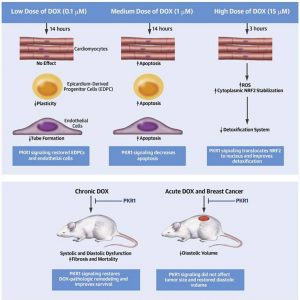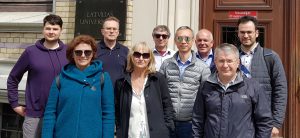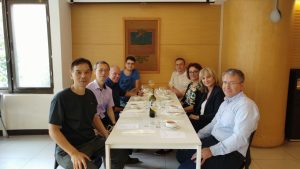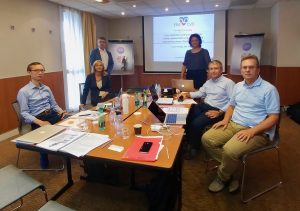Coordinator:
Canan Nebigil, INSERM, University of Strasbourg, France
Partners:
Laurent Désaubry, INSERM, Université de Strasbourg, Illkirch-Strasbourg,France
Igor Tetko, Helmholtz Zentrum München, Neuherberg, Germany
Daniela Cardinale, European Institute of Oncology, Milano, Italy
Michael Wing Yan Chan,National Chung Cheng University,Min-Hsiung Chia-Yi, Taiwan
Robert Passier,University of Twente, the Netherlands
Hasan Koyuncu, Nobel Pharma, Istanbul, Turkey
Cardiac dysfunction leading to heart failure can result from anticancer treatments. Indeed, there are neither any effective cardioprotective drugs, nor accurate early detection methods for cardiotoxicity.
The ultimate goal of the Cardio-Oncology consortium is to minimize adverse cardiotoxic effects of anticancer treatments, which will enable clinicians to fully exploit the benefits of modern cancer therapy. The development of novel and more effective and safe cardio-protective therapeutics (WP1) will reduce the risk of mortality and improve quality of life of patients with anticancer drug-induced cardiotoxicity. In addition, by identifying novel and reliable biomarkers for early detection of cardiotoxicity (WP2), the consortium ensures that treatment with the novel cardio-protective therapeutic will be specifically used in high-risk patient subgroups who will benefit most.
NEWS CORNER
July 2021
The following review is getting published: Updates on anticancer therapy-mediated vascular toxicity and new horizons in therapeutic strategies. Hsu P.Y., Mammadova A., Benkirane-Jessel N., Désaubry L., Nebigil C.G. Front. Cardiovasc. Med. 7: in press (2021).
The following article is getting published: Prokineticin signaling in heart-brain developmental axis: Therapeutic options for heart and brain injuries. Désaubry L., Kanthasam AG., Nebigil CG. Pharmacol Res. 13: 105190 (2020).
A first publication describing our work is getting published: Prokineticin receptor-1 signaling inhibits dose- and time-dependent anthracycline-induced cardiovascular toxicity via myocardial and vascular protection. Gasser A., Chen Y-W., Audebrand A., Daglayan A., Charavin M., Escoubet B., Karpov P., Tetko I., Chan MWY., Cardinale D., Désaubry L., Nebigil CG. . JACC CardioOncology 1: 84-102 (2019).

May 14-17 th 2019
Our work has been presented at ERA-Net Symposium on Cardiovascular Diseases (ERA-CVD) in Riga, Latvia. We also hold our third consortium meeting, where we discussed the latest advancements in our project.

June 16th 2018
Our second consortium meeting took place at National Chung Cheng University in Taiwan. It was extremely fruitful. The advancement of our project is quite impressive. We are grateful to Michael for this kind hospitality. We all had a great time.


June 28th 2017
Our kick-off meeting took place in Paris.



